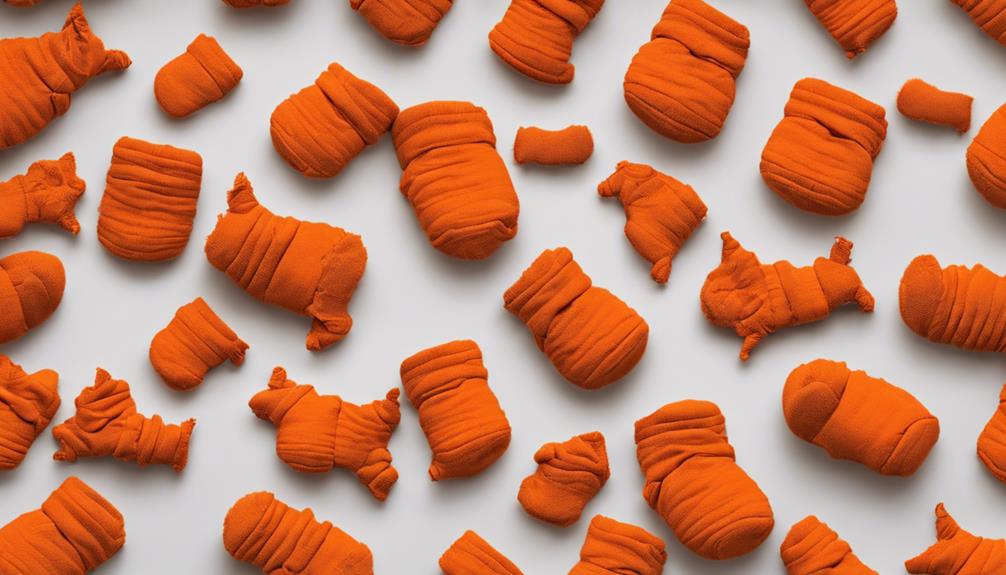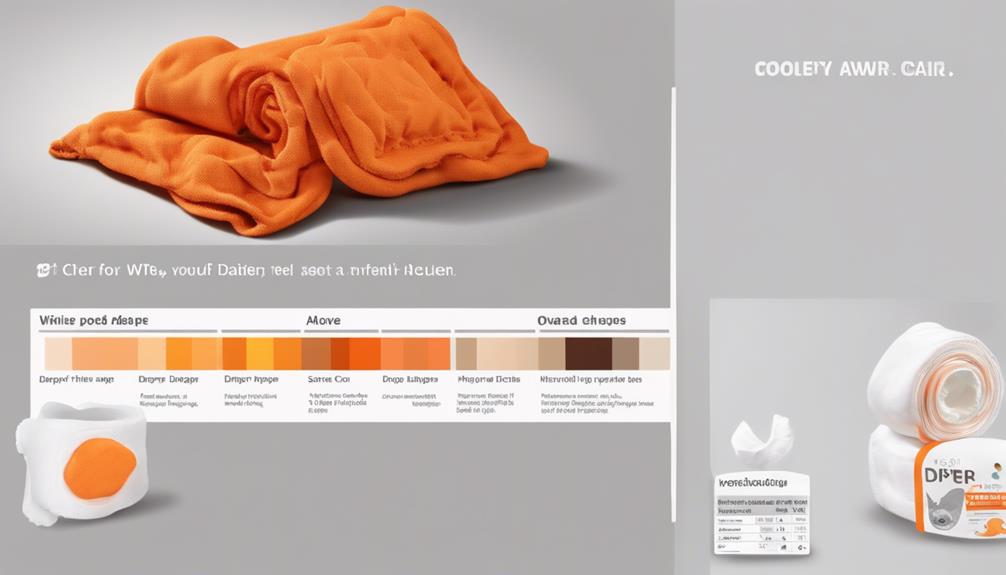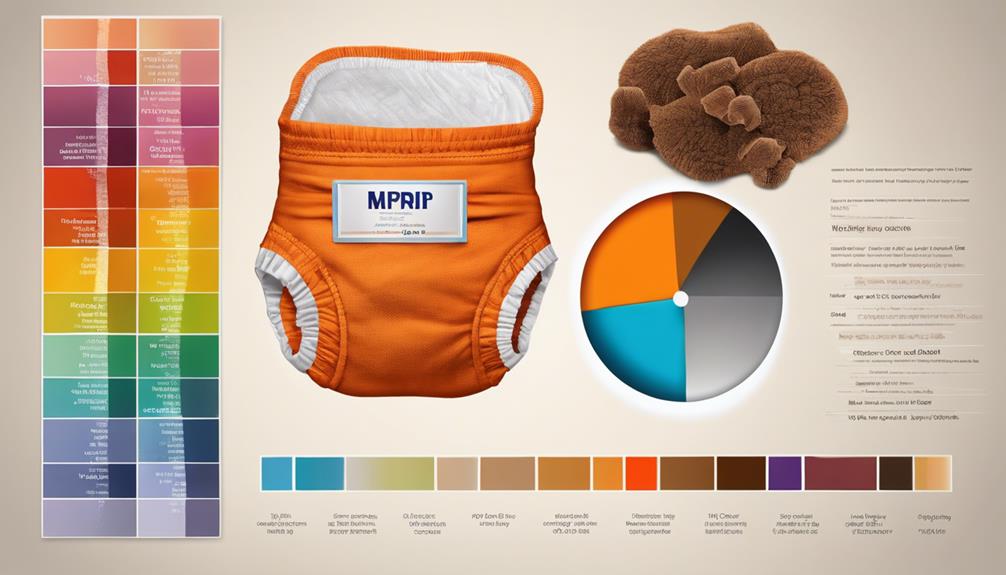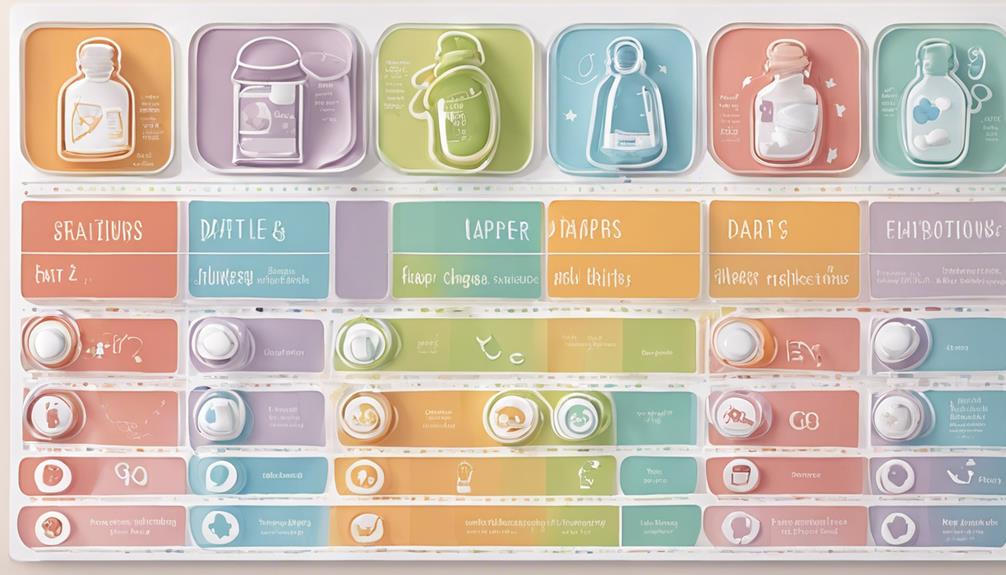As parents, we comprehend that maneuvering the world of newborn care involves managing a myriad of surprises. When it comes to a certain hue in your little one's diaper, we often find ourselves pondering about its significance.
Orange newborn poop might just be one of those mysteries that catch you off guard. But fear not, comprehending the reasons behind this unexpected color can provide valuable insights into your baby's health and well-being.
Key Takeaways
- Orange newborn poop can be caused by diet, medications, or formula ingredients.
- Monitor for accompanying symptoms and seek medical advice for persistent orange stool.
- Breastfed babies may have looser stools, while bright orange stool may indicate digestive issues.
- Establish healthy habits early, consult a healthcare provider for concerns, and monitor changes in stool color.
Causes of Orange Newborn Poop
Consuming beta carotene-rich foods like carrots or sweet potatoes can lead to orange newborn poop. In breastfed babies, the mother's diet plays an important role in determining the color of the baby's stool. If the mother consumes a lot of orange-colored foods, it can result in the baby having orange poop.
On the other hand, formula-fed infants may also experience orange stool if the formula they're given contains certain ingredients that impact stool color. Additionally, medications taken by either the mother or the baby can sometimes lead to the appearance of orange-colored poop in newborns.
Monitoring the baby's diet and any recent changes can help in identifying the cause of the orange poop. Understanding these various factors can provide insights into why a newborn may have orange stool and help parents make informed decisions regarding their baby's health.
Signs of Concern in Orange Stool

Monitoring for accompanying symptoms with orange stool is essential in identifying potential issues that may require medical attention in newborns. While orange newborn poop can be a result of consuming beta carotene-rich foods like carrots, it's important to watch out for any concerning signs.
The consistency of orange stool may vary between breastfed and formula-fed babies, so understanding what's normal for your infant is vital. If the orange stool persists for an extended period or is bright and fluorescent, it may indicate underlying digestive concerns that warrant evaluation by a healthcare provider.
Keep a close eye on your baby's stool color, especially if it's consistently orange, as this could be a sign of an underlying issue. By monitoring any symptoms that accompany the orange stool and seeking guidance from a healthcare provider if needed, you can guarantee your newborn's digestive health is well taken care of.
Managing Orange Newborn Poop
When it comes to managing orange newborn poop, understanding the potential causes and associated symptoms is key to ensuring the baby's digestive health. Orange stool in newborns can often be attributed to consuming beta carotene-rich foods like carrots or sweet potatoes.
It's noteworthy that breastfed babies may have looser stools compared to formula-fed babies, which can impact the consistency of the stool. Monitoring for any changes in appetite, the presence of a fever, or persistent orange poop is essential for identifying any underlying digestive issues that may require medical attention.
While orange stool is generally considered normal in newborns, continuous bright orange coloration could indicate an underlying problem. Seeking advice from a healthcare provider if orange newborn poop persists or is accompanied by concerning symptoms is highly recommended for proper evaluation and management of the baby's health.
Healthy Habits for Newborns

Healthy habits for newborns encompass a range of practices that promote their overall well-being and development from the earliest stages of life. To guarantee your newborn thrives, consider the following:
- Breastfeeding: Breastfed babies receive essential nutrients and antibodies from their mothers, aiding in their growth and immune system development.
- Balanced Diet: Introducing solid foods rich in beta carotene, such as carrots, can lead to orange-colored poop in newborns but is generally harmless.
- Monitoring: Keep a close eye on your baby's behavior changes and feeding patterns when observing orange poop. Any significant deviations may warrant further investigation.
- Health Issues: While orange newborn poop is often a natural occurrence, consult a healthcare provider if you notice persistent abnormalities or accompanying health issues to rule out any underlying problems.
Establishing healthy habits early on can set the foundation for your newborn's long-term well-being and guarantee they grow up strong and healthy.
Seeking Medical Advice
To ensure your newborn's health and well-being, it is important to promptly seek medical advice if orange newborn poop persists beyond a few days or is accompanied by concerning symptoms like fever or vomiting. Monitoring your baby's hydration levels is essential when observing orange stool. Medical evaluation is necessary if the orange poop is consistently watery or contains mucus. If your newborn's stool color remains orange despite dietary adjustments or shows any of these symptoms, contacting a healthcare provider is recommended. Below is a table summarizing when to seek medical advice regarding orange newborn poop:
| Situation | Action | Recommendation |
|---|---|---|
| Orange poop persists for several days | Seek medical advice | Contact your pediatrician if orange color persists |
| Orange poop accompanied by fever or vomiting | Consult a healthcare provider | Immediate medical attention may be necessary |
| Consistently watery stool or mucus present | Medical evaluation may be required | Contact your healthcare provider for further assessment |
Frequently Asked Questions
Can Newborn Poop Be Orange?
Yes, newborn poop can be orange. Factors like changing stool types and introducing certain foods can cause this color change. We should monitor for any concerning symptoms and seek guidance if the orange color persists or appears bright.
What Color Indicator Is Newborn Poop?
Newborn poop varies in color, ranging from yellow to green to brown. Color changes can signal health issues or dietary changes. Monitoring consistency and frequency helps parents gauge their baby's well-being.
What Color Is Newborn Poop After Meconium?
After meconium, newborn poop can shift to orange hues due to dietary changes or breast milk intake. It's normal and common. However, sudden or prolonged orange poop might need medical attention for potential issues.
How Do You Analyse Newborn Poop?
We analyze newborn poop by observing color, consistency, and frequency. Changes can indicate health concerns. Monitoring your baby's stools regularly allows early detection of issues. Consulting a healthcare provider for persistent changes or concerning symptoms is essential.
Conclusion
In the journey of parenting, orange newborn poop may seem like a challenging obstacle. However, just like the changing colors of a sunset, these variations are natural and temporary.
By staying vigilant, practicing healthy habits, and seeking guidance when needed, we can navigate through these challenges with grace and confidence. Remember, just as the sun always rises, so too will your little one's digestive system find its balance.
Embrace the journey, one colorful poop at a time.









